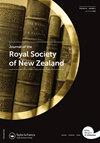Artificial Intelligence in New Zealand: applications and innovation.
IF 2.1
4区 综合性期刊
Q2 MULTIDISCIPLINARY SCIENCES
Journal of the Royal Society of New Zealand
Pub Date : 2023-02-09
eCollection Date: 2023-01-01
DOI:10.1080/03036758.2023.2170165
引用次数: 0
新西兰的人工智能:应用与创新
人工智能(AI)在各个科学研究领域和现实世界的应用中发挥着越来越重要的作用,从AlphaGo设计到医学成像分析、地震预测到鱼类分类、水果成熟度估计到在线产品推荐。新西兰奥特亚拥有世界领先的研究人员和从业者,在全球人工智能界发挥着重要作用。近年来,人工智能取得了重大成就。本期特刊旨在强调人工智能研究的最新进展以及新西兰社区在人工智能理论和应用方面的发展。这期特刊包括十篇高质量的手稿(Chiewchan等人2023,Bi等人2022,Babu等人2023、Lim等人2024、Wilson等人2026、Cranefield等人2027、Bartlett等人2028、Rodger等人20210、Sagar等人2023和Wang等人2023)。它们涵盖了广泛的人工智能技术和人工智能在现实世界中的各个应用领域。涉及的人工智能包括传统的人工智能领域,如图像分析和计算机视觉、自然语言处理和多智能体系统,以及最近的技术,如进化机器学习、深度学习、少镜头学习和可解释的人工智能。这些论文还探讨了人工智能如何应用于我们的日常生活,包括新西兰的第一产业,如农业和水产养殖,环境、健康和医疗以及福祉等关键领域,以及人工智能中对毛利人、隐私、透明度、法律和社会影响的考虑。农业以各种方式对世界产生了重大影响,随着人口快速增长导致的粮食需求越来越高,农业变得越来越重要。农民使用的许多传统方法要么人力成本过高,要么生产力不足。人工智能为以可持续和安全的方式提高农业效率和生产力提供了巨大的机会和潜力(Talaviya等人,2020)。在本期特刊中,Chiewchan等人(2023)在新西兰坎特伯雷地区开发了一个多智能体灌溉系统,该地区拥有全国最大比例的灌溉土地(70%)。已经引入了水资源许可来控制用水,但对于土地相对较小的农民来说,申请水资源许可可能过于昂贵和漫长。相反,他们可以加入社区灌溉计划,但很难准确估计他们需要多少水,因为这取决于许多因素,如作物类型、农场规模、任何强制性的节水措施以及灌溉作物的优先顺序。本文探讨了一个基于拍卖协商的多智能体系统,用于构建智能灌溉管理系统,以最大限度地实现社区内的水资源共享。每个代理人代表一个农民与其他农民谈判,并在买卖过程中做出决定。研究了不同的拍卖机制,结果表明,多单元统一拍卖策略在有效分配社区多余水量方面表现最好。
本文章由计算机程序翻译,如有差异,请以英文原文为准。
求助全文
约1分钟内获得全文
求助全文
来源期刊

Journal of the Royal Society of New Zealand
综合性期刊-综合性期刊
CiteScore
4.60
自引率
0.00%
发文量
74
审稿时长
3 months
期刊介绍:
Aims: The Journal of the Royal Society of New Zealand reflects the role of Royal Society Te Aparangi in fostering research and debate across natural sciences, social sciences, and the humanities in New Zealand/Aotearoa and the surrounding Pacific. Research published in Journal of the Royal Society of New Zealand advances scientific knowledge, informs government policy, public awareness and broader society, and is read by researchers worldwide.
 求助内容:
求助内容: 应助结果提醒方式:
应助结果提醒方式:


